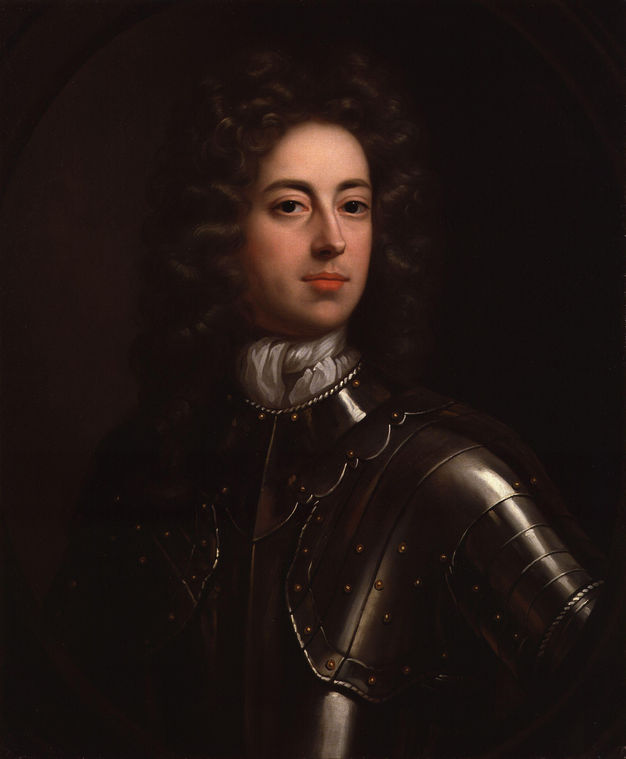
Historyzine: The History Podcast
Jim Mowatt
History narrative, linguistic history trivia and history podcast reviews, all topped off with the current special feature, which is the War of the Spanish Succession. This stars, Louis XIV, the Duke of Marlborough, Prince Eugene, Anthony Heinsius and many thousands of supporting soldiers. Jim is a history enthusiast who loves telling stories and adores rummaging about amongst the delights and horrors of the past.
- 12 minutes 6 secondsThe Spanish Flu Timeline
In The first episode of those series we did an introduction. In the second we tried to make an emotional connection with the pain and suffering caused by the Spanish Flu. In this episode we seek to construct a timeline so that we have something coherent, on which we can hang all the events, and reactions to the events, that we will look at later in the series.
This is my attempt to do that.
In this third episode I follow the progress of the epidemic as it sweeps across the world, mutating in form and virulence throughout the three waves.
We see the initial wave of infection causing a huge amount of death and chaos in April to June 1918. There is then the second and more deadly wave of the flu pandemic, appearing initially in Brest, Freetown and Boston, in August to December and then the return of the disease in the early part of 1919.
A vicious 3 wave attack on the entirety of humanity.
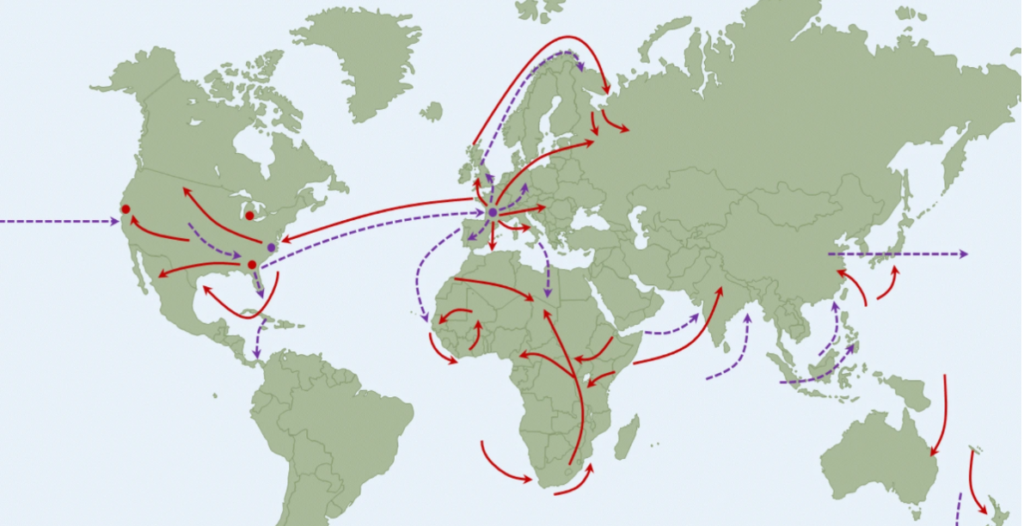 Red lines, first wave, blue dashed lines, second wave
Red lines, first wave, blue dashed lines, second wave
BMC InfectionReferences for podcast content:
The Spanish Influenza Pandemic of 1918-1919: New Perspectives edited by David Killingray, Howard Phillips
Pale Rider: The Spanish Flu of 1918 and How it Changed the World by Laura Spinney
22 June 2020, 5:00 am - 12 minutes 57 secondsThe Spanish Flu – A Grisly Death Indeed
For this episode of the podcast I wanted to try and get a feel for the actual experience of suffering the disease. I wanted to know what Spanish Flu was like on a personal level.
To accomplish this I needed to uncover contemporary accounts from the time, that gave details of the damage inflicted and the distress caused by the influenza.
I was surprised to find relatively few of these accounts but I did find one that had everything that I required. It is fictional but is written by someone who had suffered and survived a severe bout of Spanish Flu in 1918.
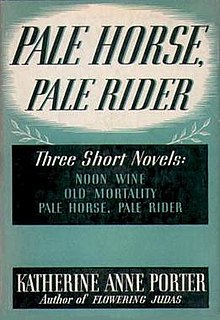 This is the story, Pale Horse, Pale Rider by Katherine Anne Porter. It is beautifully written and heart rendingly tragic. It concerns a newspaper woman Miranda and a soldier, Adam. It is an incredibly detailed account of the symptoms and, in particular the delirium and confusion of the experience
This is the story, Pale Horse, Pale Rider by Katherine Anne Porter. It is beautifully written and heart rendingly tragic. It concerns a newspaper woman Miranda and a soldier, Adam. It is an incredibly detailed account of the symptoms and, in particular the delirium and confusion of the experienceThis podcast also draws upon information in the article, “It’s as Bad as Anything Can Be”: Patients, Identity, and the Influenza Pandemic by Dr Nancy K Bristow https://doi.org/10.1177%2F00333549101250S316
16 June 2020, 6:50 am - 11 minutes 50 secondsHistoryzine – The Spanish Flu Series – Episode 01 – The 1918 Pandemic
History is a series of recurrences.
Over and over again we see much that is similar. While history doesn’t exactly repeat itself, it does often rhyme (wish I’d have said that but it was actually Mark Twain). We are currently (spring 2020) in the middle of a global pandemic, the like of which we could not have imagined only a few short months ago.
However, I wonder if we could – if we should have been able to imagine it.
In 1918 there was a pandemic that was very similar in scope to what we see now, although we have to hope, that we don’t match the scale of that one. The flu pandemic of 1918 (widely known as the Spanish Flu) killed between 17 and 100 million people. It spread extremely fast and affected almost every part of the world.
Our current Coronavirus pandemic, although a different virus, is affecting us in extremely similar ways.
In this series I intend to look at the similarities and the differences between the two outbreaks and maybe see if there are useful lessons that we could learn from the 1918 flu epidemic.
This first episode sketches out some of the basic facts behind the Spanish Flu to provide us a base, to probe a little deeper into the lives of those who went before us, and how they coped with this horror.
We will explore how it started, how it progressed and how destructive it was.
In future episodes we will look at the ways in which people reacted, and the actions that governments took to combat the virus. There will be letters from the period, advertisements for bizarre medicines and conspiracy theories as tangled and strange as those we see today.
I invite you all to accompany me on this journey as we explore this comparison between our present Coronavirus and the 1918 Spanish Flu, and see how alike, or unalike they actually are.
 8 June 2020, 11:16 pm
8 June 2020, 11:16 pm - 41 minutes 21 secondsHistoryzine 019: The Battle of Oudenarde
Historyzine’s retelling of The War of the Spanish Succession now reaches the year 1708 and the Battle of Oudenarde. The Duke of Burgundy and the Marshall Vendome make initial gains in the Spanish Netherlands moving swiftly to take control of the fortress cities of Ghent and Bruges. Looking to strengthen their supply routes back toward France they move toward Oudenarde.
The allies move fast and manage to surprise the French army just to the North of the city.
The troops engage but it’s all a bit hesitant until Rantzau launches his cavalry, slamming into the unprepared left flank of the French army. More and more troops are fed into the fray and the battle front extends further and further and further with both sides continually threaten to flank the other. The allied troops are moving on to the battlefield from the bridges at Eename but also General Overkirk is advancing through Oudenarde itself with 25,000 troops. He will take these troops around the back of the French battle line and then, hopefully take them by surprise. By 10 o clock at night the French find themselves almost completely encircled.
So, that’s the special feature section – The War of the Spanish Succession.
In the magazine portion of the show we look at the word ‘ye’.
I interview the military history author, James Falkner
and there is a review of the podcast, A History of Rome.
The music you hear in this podcast is by Gustav Holst and you’ll be able to download it from the website http://musopen.com/
If you wish to comment on the podcasts then please visit the website, historyzine.com or visit the contact page and leave me an email using the contact form there.
Also I wish to draw your attention to the twitter feed we’ve started for the Historyzine History podcast.
You’ll find Historyzine twittering away at http://twitter.com/Historyzine .
I hope you enjoy the podcast. Press the play button below to listen or subscribe (it’s completely free) using one of the two buttons at the top of this post. One will link you to your Itunes program and the other will give you an rss link for your podcast feed aggregator. Happy listening.
28 April 2010, 4:45 pm - 48 minutes 1 secondHistoryzine 018: 1707
Historyzine now moves into the year 1707 in the saga of the War of the Spanish Succession. This year the allies are looking to attack Toulon and hopefully make more gains in the Spanish Netherlands. The Duke of Marlborough has an army of 80,000 in the Low countries facing off against Villars who has 100,000 under his control. Prince Eugene leads an army of 35,000 against Toulon and the Earl Galway is left with only 15,500 in Spain which he uses to bring the Duke of Berwick to battle at Almanza.
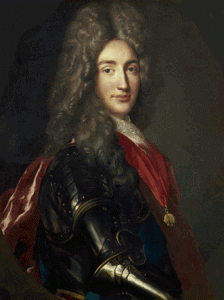
Galway, of course, is on to a loser and is soundly beaten by the French in a terrible setback for the allies in Spain. They fair little better at Toulon and after an abortive siege there, they retreat back to Italy. The Admiral supporting this endeavour is Sir Cloudesley Shovel and he returns home only to be shipwrecked in one of the worst naval disasters ever recorded, off the Scilly Isles, only a few miles from port It’s a poor year for the Anglo/Dutch/English and Portuguese alliance and all around they are beset by failure and disaster.
In the magazine portion of the show the Linguistic History Trivia Bit, looks at the words Avatar, Thug and Blighty. As the more perceptive among you will note, all these words have an Indian origin. The Indian theme grows out of one of the History podcast reviews which is of the UCLA series on British India.You’ll find this series at the UCLA Office of Instructional Development. The other podcast review this time is the series, Stuff you Missed in History Class.
There’s a couple of announcements in the show. I exhort you to visit my online shop at http://historyshopper.com. to take a look at my history themed birthday cards and also to come along to the Marlborough Study Day on march 13th at the Assembly House in Norwich . This will feature the military history writers, James Falkner and Richard Holmes and it’s a Battlefields Trust Event . Tickets are only 15 pounds, with part of the proceeds going to Help for Heroes . Here is the note which appeared in the Early 18th Century Wars mailing list
We have Richard Holmes and James Falkner speaking at Norwich on Marlborough and his battles on Saturday March 13th at 14:00 at The Assembly House.
Tickets available from 20 Rowington Road, Norwich. NR1 3RR.
Please make cheques available to the Battlefields Trust.
The intro music for this episode is Die Valkure Fantasie, composed by Richard Wagner.
Some of the sources I use for this podcast can be found at My Amazon UK Affiliate page
or my United States of America Affiliate page . There are lots of very useful books there if you want to know more about the War of the Spanish Succession and if you decide to buy any of them then using the links from the pages of Historyzine will send a tiny fraction of money my way which will help offset some of the costs of the podcast.If you wish to comment on the podcasts then please visit the website, historyzine.com or visit the contact page and leave me an email using the contact form there.
Also I wish to draw your attention to the twitter feed we’ve started for the Historyzine History podcast.
You’ll find Historyzine twittering away at http://twitter.com/Historyzine .
I hope you enjoy the podcast. Press the play button below to listen or subscribe (it’s completely free) using one of the two buttons at the top of this post. One will link you to your Itunes program and the other will give you an rss link for your podcast feed aggregator. Happy listening.19 February 2010, 3:24 pm - 1 hour 2 minutesHistoryzine 017: The Aftermath of Ramillies
Historyzine 17 features 1706 and the Aftermath of Battle of Ramilies as well as the relief of Turin in our War of the Spanish Succession section. In the linguistic history trivia bit we’ll be looking at a couple of printing terms which have morphed into regularly used modern day phrases. The phrases I’ll be focussing upon are, uppercase and lowercase as well as getting ahold of the wrong end of the stick. They’re a fascinating couple of phrases and I very much enjoyed researching their provenance.
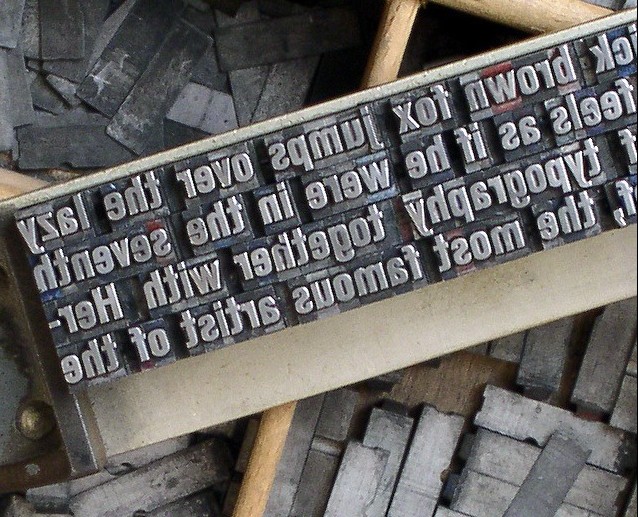
Composing Stick
We have a short interview with Richard Saunders from Historypress who talks a little about the most popular of the history books at the History Press and tells us a little about the commissioning and submission procedures at the History Press.
The are two history podcast reviews this time. We’ll be turning the spotlight on Living History, a podcast for reenactors and the new BBC/British Museum podcast, A History of the World in 100 objects. These are both fascinating podcasts for very different reasons.
There’s some feedback from Portugal and also the announcement of my new online shop for history nerds which you’ll find at http://historyshopper.com/
The War of the Spanish Succession takes up a goodly portion of the show this time. We looked at the battle of Ramilies in the last episode and now we move on to see if the allied army can take advantage of the situation. However, things still look bleak for the allies in Italy. Turin is under siege and may fall all too soon. Prince Eugene after his defeat at Calcinato is rushing to relieve the city but his forces are barely adequate.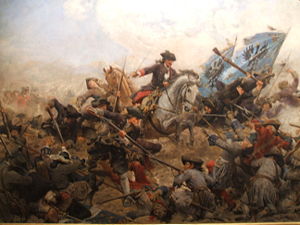
This is quite a long episode at just over an hour so I’ll give you some timings in case you wish to skip about in the podcast.
0.00 to 0.32 Intro Music
0.32 to 6.18 Intro and feedback
6.18 to 12.23 Review of the Living History Podcast
12.23 to 16.00 Review of A History of the World in 100 Objects
16.00 to 21.03 Linguistic History Trivia Bit
21.03 to 23.47 Interview with Richard Saunders from Historypress
23.47 to 25.27 Announcement of HistoryShopper shop for history nerds: This shop is selling History themed birthday cards at the moment and can be found athistoryshopper.com/
25.27 to 1.01.16 War of the Spanish Succession
1.01.16 to 1.02.03 Outro Music.The intro music for this episode is The Brandenburg Concerto 6 by Johann Sebastian Bach and the outro music is also by Bach and is Air on the G String.
Some of the sources I use for this podcast can be found at My Amazon UK Affiliate page
or my United States of America Affiliate page . There are lots of very useful books there if you want to know more about the War of the Spanish Succession and if you decide to buy any of them then using the links from the pages of Historyzine will send a tiny fraction of money my way which will help offset some of the costs of the podcast.If you wish to comment on the podcasts then please visit the website, historyzine.com or visit the contact page and leave me an email using the contact form there.
Also I wish to draw your attention to the twitter feed we’ve started for the Historyzine History podcast.
You’ll find Historyzine twittering away at http://twitter.com/Historyzine .
I hope you enjoy the podcast. Press the play button below to listen or subscribe (it’s completely free) using one of the two buttons at the top of this post. One will link you to your Itunes program and the other will give you an rss link for your podcast feed aggregator. Happy listening.29 January 2010, 11:09 pm - 38 minutes 3 secondsHistoryzine 016 – Ramillies

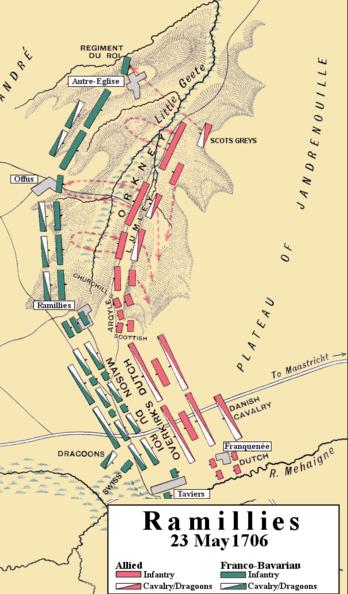
This is Historyzine, Episode 16 featuring 1706 and the War of the Spanish Succession. In Spain, Lord Peterborough and the Archduke Charles are busily not speaking to each other when perhaps they should be putting Charles on the throne and consolidating their power. In Flanders in this same year the Duke of Marlborough is leading his troops up against the French at the Battle of Ramillies. This is a particularly fascinating battle as it is a very clear demonstration of military distraction technique. This battlefield definitely dictates the strategy for the battle with only one section of it available for cavalry action but Marlborough manages to convince Villeroi that he’s going to do something else entirely. Villeroi falls for this feint and the rest is history.As you can see from this map, the only clear country in which you can properly engage your cavalry is that section inbetween Overkirk’s troops and the Maison Du Roi.
The Linguistic History Trivia Bit for this episode covers the phrase, ‘Nose to the Grindstone’ as shown in this jolly picture.
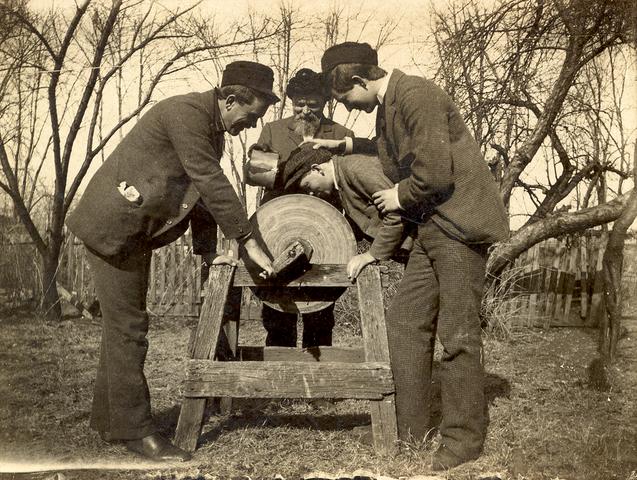 The podcast review for this time is Lars Brownworth’s delightful new podcast, The Norman Centuries. I don’t think I’m giving much away when I say I very much enjoy this podcast and await, with delight, each new episode.
The podcast review for this time is Lars Brownworth’s delightful new podcast, The Norman Centuries. I don’t think I’m giving much away when I say I very much enjoy this podcast and await, with delight, each new episode.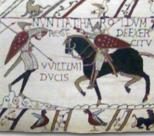
Some of the sources I use for this podcast can be found at My Amazon UK Affiliate page
or my United States of America Affiliate page . There are lots of very useful books there if you want to know more about the War of the Spanish Succession and if you decide to buy any of them then using the links from the pages of Historyzine will send a tiny fraction of money my way which will help offset some of the costs of the podcast.
If you wish to comment on the podcasts then please visit the website, historyzine.com or visit the contact page and leave me an email using the contact form there.
Also I wish to draw your attention to the new twitter feed we’ve started for the Historyzine History podcast.
You’ll find Historyzine twittering away at http://twitter.com/Historyzine .
I hope you enjoy the podcast. Press the play button below to listen or subscribe (it’s completely free) using one of the two buttons at the top of this post. One will link you to your Itunes program and the other will give you an rss link for your podcast feed aggregator. Happy listening.
5 November 2009, 12:25 am - 26 minutes 52 secondsHistoryzine 015: Winter Diplomacy in 1705
Historyzine follows the Duke of Marlborough as he conducts an epic journey of almost 2000 miles by carriage and barge during the fierce winter months in order to soothe and cajole the various allies.
The Duke visits the Elector Palatine, The Margrave of Baden, the King of Prussia and the Electoral Prince of Hanover and then returns to the Hague in the Netherlands to sort out the paperwork for the forthcoming campaign. This isn’t the most dashing and exciting of the stories surrounding the Duke and the War of the Spanish Succession but it is, I feel, a fascinating insight into the multiplicity of roles the Duke of Marlborough was expected to fulfil. Here’s a map of Europe and I’ve drawn a little red line showing aproximately the route he’s taken. click to enlarge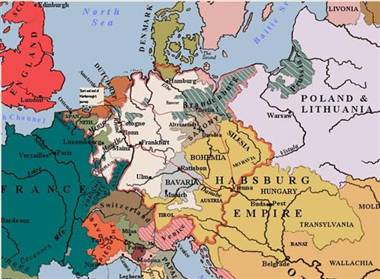
We also take a brief look at the gains made by the Austro/Dutch/English alliance in Spain and the dashing but frustrating Earl of Peterborough. In this episode Historyzine also reviews the book, The Suspicions of Mr Whicher by Kate Summerscales
and the podcast, ‘The Jefferson Hour’ which can be found at www.jeffersonhour.orgIf you wish to leave feedback on the podcast then do so through the site http://historyzine.com/ or use the contact page to send a form email http://historyzine.com/contact/
8 September 2009, 8:21 pm - 38 minutes 18 secondsHistoryzine 014: Forcing the lines of Brabant (1705)


Family History – connecting up with large scale history. I’ve recently spent a considerable amount of time delving into my family history and been quite delighted by the reflection of large scale events such as the industrial revolution, highland clearances and the potato blight of 1846 that are to be found in the movements of my ancestors.Exploring the phrase – Fork it over. Is it a man with a pitchfork handing over his produce to the landlord or is it a pickpocket thing?
A review of ‘In Our Time’. The BBC radio 4 series ‘In Our Time’ is placed under the Historyzine microscope.
The War of the Spanish Succession, 1705 – Forcing the Lines of Brabant.
The Duke of Marlborough after his successes in Bavaria in 1704 is gathering his forces for a push up the Moselle into France. The allies from Baden, Hanover and Austria are not ready for the start of the campaign so the plans are thrown into disarray. The French generals Villars and Villeroi lead Marlborough a merry dance as they make the most of their advantage.

 Then Marlborough formulates a plan to attack the Lines of Brabant feinting toward the weakest part of the lines and then changing direction under cover of darkness to attack the lines at their strongest point. The plan works brilliantly. The lines are dismantled and the forces of England, the Netherlands and Austria once more hold the upper hand against those of France, Spain and Bavaria.
Then Marlborough formulates a plan to attack the Lines of Brabant feinting toward the weakest part of the lines and then changing direction under cover of darkness to attack the lines at their strongest point. The plan works brilliantly. The lines are dismantled and the forces of England, the Netherlands and Austria once more hold the upper hand against those of France, Spain and Bavaria.Some of the sources I use for this podcast can be found at My Amazon UK Affiliate page
or my United States of America Affiliate page . There are lots of very useful books there if you want to know more about the War of the Spanish Succession and if you decide to buy any of them then using the links from the pages of Historyzine will send a tiny fraction of money my way which will help offset some of the costs of the podcast.If you wish to comment on the podcasts then please visit the website, historyzine.com or visit the contact page and leave me an email using the contact form there.
28 February 2009, 12:33 am - 42 minutes 24 secondsHistoryzine 013: History Podcast – The Aftermath of Blenheim


The history of Europe was altered forever by the Battle of Blenheim. In this episode I talk about the aftermath of the battle and look at the celebrations in England. The country is delirious with delight and Marlborough is granted the estate of Woodstock and given funds toward the building of a palace to commemorate the victory. That palace was built and named after the battle as Blenheim PalaceIt is a truly overwhelming place to behold. I’ve visited several times and have always been quite breathless at the sheer scale and extravagance of the building.
In the podcast I speculate on the direction events may have taken if the Franco Bavarian forces had been sucessful in the 1704 Battle of Blenheim and we wander off down several avenues of what if speculation.
In the history podcasts review section I review the All Things Medieval podcast.
I also review the new film, the Duchess which stars Ralph Fiennes and Keira Knightley. This film is based upon the wonderful book ‘Georgiana’ by Amanda Foreman. I highly recommend the book as an intriguing insight into the lives of the rich and famous in 18th century England. As you’ll hear in the podcast, I’m not sure I can recommend the film quite as highly.
I did, however discover a couple of BBC mini series DVDs that I can recommend.
There’s a biopic of Charles II
. This is a lively account of the life of this merry monarch but it makes a case for him also being more politically savvy than he’s usually given credit for.
I also encountered a low budget, but still very watchable BBC docudrama called ‘The Early Churchill’s’ which covers the lives of John and Sarah Churchill, the first Duke and Duchess of Marlborough.
. This is a very long docudrama which contains lots of fascinating detail about this couple although can be a little skimpy as regards the War of the Spanish Succession and the history of europe at the time.The linguistic history trivia bit in this episode is a look at the word Macaroni and what it meant when bandied around in the coffee houses of 18th century London. It’s a fun word describing quite a bizarre fashion set. You’ll find out more by listening to the podcast either by clicking on the play link at the end of this post or downloading and playing it in Itunes.
As promised in the podcast, here is the link to the program, levelator.
Some of the sources I use for this podcast can be found at Amazon.co.uk in the UK
or at Amazon.com in the United States. There are lots of very useful books there if you want to know more about the War of the Spanish Succession and if you decide to buy any of them then using the links from the pages of Historyzine will send a tiny fraction of money my way which will help offset some of the costs of the podcast.If you wish to comment on the podcasts then please visit the website, historyzine.com or visit the contact page and leave me an email using the contact form there.
22 October 2008, 6:30 pm - 54 minutes 15 secondsHistoryzine 012: The Battle of Blenheim
In Historyzine 12 our main feature is 1704 and the battle of Blenheim. John Churchill (Duke of Marlborough) is rampaging around Bavaria with the Dutch, Hesse, Austrian, Hanoverian and English troops. Gathering against him under the command of Marshall Tallard, Marshall Marsin and the Elector of Bavaria are the troops of France and Bavaria accompanied by various mercenaries.

Maximilian II Emanuel, Elector of Bavaria.
Despite his careful planning Marlborough finds no siege train waiting for him in Germany. The food he requested is not there and various troops have been diverted into Italy and Hungary. Undaunted the Duke and the Prince (Prince Eugene of Savoy) bring the Franco Bavarian forces to battle at Blenheim. In this history podcast I describe the battle of Blenheim and try to show how the various general’s decisions made the difference on that fateful day.

Salamander Cutts
1st Baron Lord Cutts was nicknamed Salamander due to his penchant for always being where the fire was hottest. He was referred to by the Satirist Jonathan Swift as being as ‘brave and brainless as the sword by his side.’ Cutts lead Marborough’s left wing attack upon the village of Blenheim.
In the more general section of this podcast we look at the word Jacobean and attempt to straighten out a few myths regarding the Jacobite cause.
The history podcast review this time concerns the Stanford University series of lectures on Hannibal.
Some of the sources I use for this podcast can be found at Amazon.co.uk in the UK
or at Amazon.com in the United States.If you wish to comment on the podcasts then please visit the website, historyzine.com or visit the contact page and leave me an email using the contact form there.
27 August 2008, 7:53 pm - More Episodes? Get the App
- http://historyzine.com
- en-US
Your feedback is valuable to us. Should you encounter any bugs, glitches, lack of functionality or other problems, please email us on [email protected] or join Moon.FM Telegram Group where you can talk directly to the dev team who are happy to answer any queries.
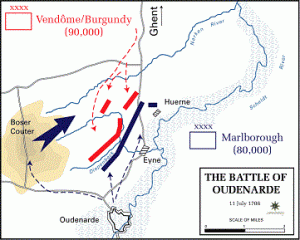
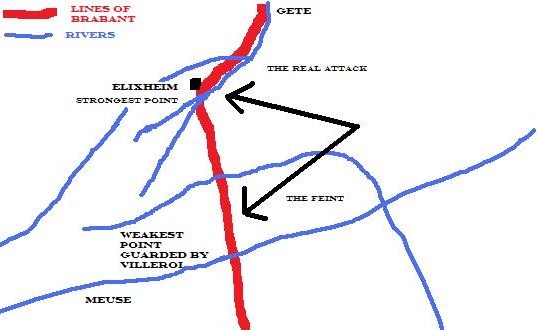

 Binge Thinking History
Binge Thinking History
 Popular History of France from the Earliest Times vol 3, A by GUIZOT, François Pierre Guillaume
Popular History of France from the Earliest Times vol 3, A by GUIZOT, François Pierre Guillaume
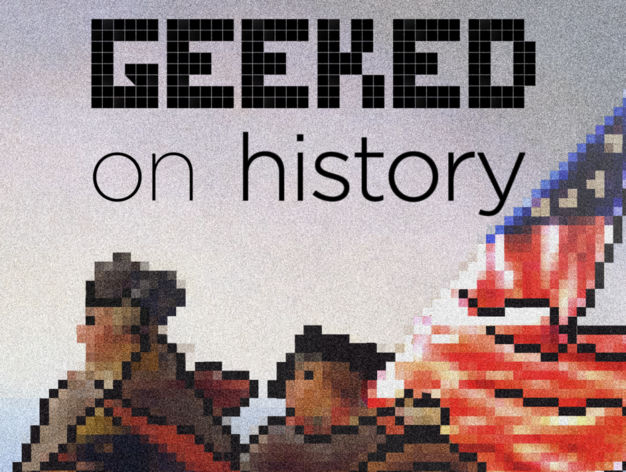 Geeked on History
Geeked on History
 Popular History of France from the Earliest Times by Francois Guizot
Popular History of France from the Earliest Times by Francois Guizot
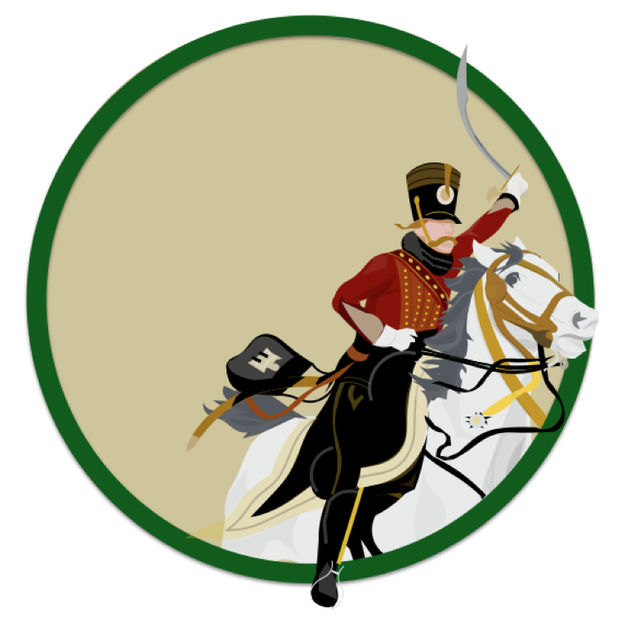 History Podcast 1792 - 1815 (+ USA history)
History Podcast 1792 - 1815 (+ USA history)